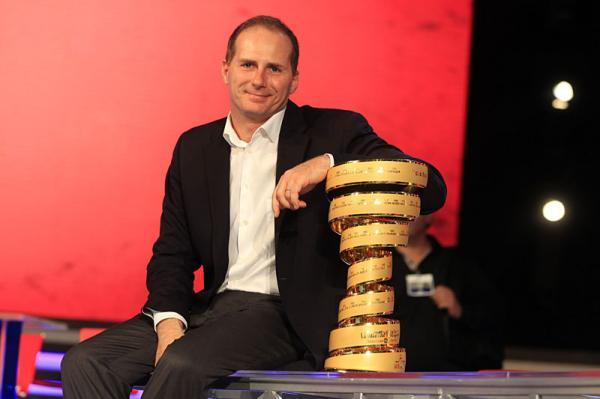Acquarone: the WorldTour must have 18 teams
Giro left to ponder CAS ruling on Katusha

Michele Acquarone has reacted to the news that CAS has ordered the UCI to grant Katusha a WorldTour licence, saying that the sport’s governing body must clarify the situation quickly. Acquarone is the head of RCS Sport and organises Italy’s premier races including the Giro d’Italia, the Tour of Lombardy and the Strade Bianche.
Katusha’s WorldTour status would create 19 teams in cycling’s top tier, however the 18 existing WorldTour teams and four wild cards have already been invited to the race. Katusha missed out on a wildcard position this year, meaning that if they were shoehorned into the race 23 teams would take to the start in Naples on May 4.
“What a mess. Now we have 19 teams so I’m curious to see what’s going to happen. We’ve planned everything for 18 teams and then the wildcard teams. We’re not ready for 19 WorldTour teams. Logistically everything has been set up for races like Tirreno and the Giro. I really don’t know how we’d have one more team in the race,” Acquarone told Cyclingnews.
UCI regulations are clear that the WorldTour is comprised of 18 teams, meaning that one team may have be forced to sacrifice it’s current status for Katusha.
“I’m curious to see what the UCI are going to do. Maybe they’ll take one team out of the WorldTour because as it stands we’ve got an agreement for 18 teams, not 19. I just don’t know. At the moment I think we have to go back to 18 teams but I will speak to the UCI next week and help to work on finding a solution.”
A bit of history
The number of teams in the sport's top tier has been just one source of conflict between the UCI and the Grand Tour organisers since the inception of the series in 2005.
The latest race content, interviews, features, reviews and expert buying guides, direct to your inbox!
The ProTour was founded to create a sense of consistency in the top division and to provide teams with assurances they would be invited to the Grand Tours at a time when invitations were often arbitrary and politically-based.
There were 20 teams in the ProTour in 2005, 2006 and 2007, leaving the races only two spots to fill with wild card choices. That didn't sit well with the organisers, who preferred to support the teams from their own countries over higher-ranked foreign teams. The requirement to invite all 20 teams to the Grand Tours was respected in 2005 and 2006, but after Operacion Puerto, that all changed.
The situation came to a head when Unibet was granted a spot in the ProTour, and then Astana was given its license late after being given more time to solve issues with its application. That made 20 teams for the 2007 season, much to the chagrin of the ASO, the organiser of the Tour de France.
The ASO left Unibet out of its races, including the early season Paris-Nice, citing national gambling laws as their reason, but it was a thinly veiled political move against the UCI as well as an attempt to appease its own sponsors, who were competitors of the online betting company. The UCI dug in its heels, threatening to remove the race's ProTour status unless the ASO conformed to the rules of the ProTour.
While Unibet took legal action, RCS Sport and Unipublic, organisers of the Giro and Vuelta, joined ASO in protesting against the UCI and the ProTour and excluded the team from most of their races. Unsurprisingly, Unibet dissolved at the end of the 2007 season.
In 2008, the UCI backed the number of WorldTour teams down to 18 after the demise of Unibet and the Discovery Channel team. That, however, did not solve the conflict as the organisers insisted on forging ahead with making their own decisions on race invitations.
RCS Sport left out four ProTour teams from the Giro d'Italia, and ASO declined to invite Astana after it disgraced the Tour de France with positives from Alexandre Vinokourov, Andrei Kashechkin and Matthias Kessler around the 2007 edition.
The conflict led ASO to run Paris-Nice and the Tour de France outside the aegis of the UCI, and to employ the AFLD to run doping controls for the Tour de France. The French agency successfully uncovered the use of a new EPO drug, CERA, when it declared Riccardo Ricco as the first rider to test positive for the substance in that year's race.
The highly political battle continued as the UCI suspended the French Federation, removing its representatives from the UCI committees, and pulling it from eligibility to host the World Championships for any discipline.
The fight was resolved one day after Lance Armstrong announced his comeback from retirement, when the UCI signed a peace agreement with the ASO, RCS Sport and Unipublic. The UCI had Hein Verbruggen step down as vice president, while ASO jettisoned its president Patrice Clerc in favor of Jean-Etienne Amaury, the son of the ASO founder Philippe.
Since then, the newly branded WorldTour and the Grand Tours have enjoyed a relatively peaceful four seasons, but it remains to be seen if the Katusha decision will disrupt that delicate balance.
Daniel Benson was the Editor in Chief at Cyclingnews.com between 2008 and 2022. Based in the UK, he joined the Cyclingnews team in 2008 as the site's first UK-based Managing Editor. In that time, he reported on over a dozen editions of the Tour de France, several World Championships, the Tour Down Under, Spring Classics, and the London 2012 Olympic Games. With the help of the excellent editorial team, he ran the coverage on Cyclingnews and has interviewed leading figures in the sport including UCI Presidents and Tour de France winners.
